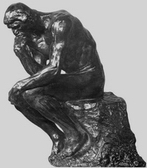| Hypercommunication - Crash Courses - Second-order Systems Theory [ Hyper-Library ] [ Hyper-Lexicon ] [ back ] |
|
|
backward - Page 3 - forward |
|
The present hyperbook "Second-order Systems Theory" can be read as an unconventional introduction to a non-conventional extension of system theory. The unconventional thing about this introduction is that - against all pedagogical tricks - I first explain what system theory is, instead of listing dripping world-weariness problems that could be solved with it. H. von Foerster proposed the unconventional extension of the systems theory presented here as cybernetics of cybernetics or as second-order-cybernetics. This extension of cybernetics has also become known under the label Radical Constructivism. The 2nd order refers to a certain kind of self-reference by which the system theorist - and thus every empathetic reader of this text - represents himself in the system described by this theory. I am writing this Second-order systems theory self-referentially in two respects. First, in this Systems Theory I describe what I call Systems Theory; so I write self-referentially about my designation. And secondly, with this systems theory I describe the observer of this theory as a system. So every reader can - as I do - read a contingent proposal on how she could understand herself in systems theory. I understand this systems theory in this sense as a subjective and subject-oriented statement of mine about myself, which every reader with self-reference can also achieve. That is why I use I-formulations that are frowned upon in science, not to say forbidden. It seems reasonable to me to speak of personalized system theories - based on the present 2nd order system theory. The inclined reader will read the "I" as I, and thus invent contigences about himself, instead of discovering one or even the reality. |

|
At the center of this systems theory is the dialogical principle, which was highly developed by M. Buber. Dialogical communication helps me - dia logos (through the word) - to recognize how I perceive what. I understand this system theory as a dialogical utterance in which I self-referentially develop an operative understanding of the communication meant in dialogue. With this systems theory I explain to myself - and to you, if you read the "I" as I - aspects of the dialogue in which I present systems theory. The system theory helps me to understand how I am involved in the dialogue (note 1).
I write this systems theory dialogically in a terminologically bound sense of the word. V. Flusser and D. Bohm have described the dialog functionally and operationally in detail. In my opinion, the essential characteristic of the dialogical attitude is not the renunciation of objectivity, but the renunciation of an intersubjectivity in which the other should understand what is the case or at least what I mean. So I am not describing what systems theory is at all, but how I use the terms. I am not interested in some universal terminology, but in understanding language as perspective and subjective. I do not strive for other people to speak the same way. I prefer it when everyone speaks with their tongue. My goal is a "dialogical" realization in which I reflect my own language on other people's ways of expression: "You make me aware that I speak in such a way, where you show that one can also speak differently". In dialogue, it is not about everyone using the same words, but about everyone finding their own expression (note 2).
By picking up other people's formulations, I stand on the shoulders of giants who have picked up what they had in mind. Their formulations help me to find my own expression. Perhaps my formulations help someone find their own expression. This is where I see the meaning of every dialogue. In dialogue I find which formulations are possible (variation) and which suit me (selection). This is especially true for system-theoretical statements.
What I say has a meaning for me, while the text that carries the statement has an object meaning. Faced with artifacts - and texts I recognize as artifacts - I can ask about meaning and sense. A bridge, for example, has the meaning of giving a way across an abyss. But it only makes sense for someone who wants to go to the other side. For me, the meaning of this system theory lies in constructing certain explanations. If I don't want any explanations or if I don't want the explanations I create with this theory, system theory doesn't make sense to me. Whether or not systems theory makes sense must be decided by each individual, whereas the objective meaning is, of course, ever produced by the respective (re)constructor.
* * *
I have developed this systems theory in connection with various learning events at universities and technical colleges. I gained the basic ideas in courses on Radical Constructivism, which I moderated at the Center for Continuing Education at the University of Zurich. There I had the opportunity to meet many prominent representatives of radical constructivism (among others E. von Glasersfeld, H. von Foerster, G. Spencer-Brown), who influenced my ideas. In these events I became aware of how different one can construct "worlds", but in particular also system theories. It was precisely because we advertised the events at the university that the question of science was always in the foreground. In the 2nd order, I see every science as being in a state of suspension, because science treats objective objects, not singular events like the "I". In a certain sense, the inclusion of self-reference in systems theory can be seen as an alternative to mysticism, which is often invoked, where science - as in the so-called postmodern age - appears to be more dogmatic than all other religions (note 3).
|
|
backward - Page 3 - forward |